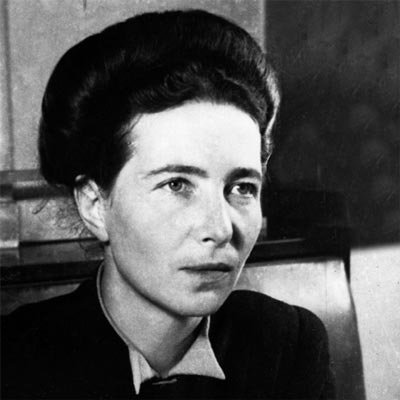Born: Jan 9, 1908, Paris, France
Died: April 14, 1986, Paris

Simone de Beauvoir was a French novelist, playwright, autobiographer and essayist. One of the most important writers of her generation, she became known as an influential feminist theorist and a key exponent of existentialism, a movement in philosophy that emphasizes individual freedom and choice. Her autobiographical works are essential for an understanding of her era because they illustrate, with actual circumstances and events, the fundamental tenets of existential philosophy.
Beauvoir was born in Paris and spent her life there. She studied at the École Normale Supérieure and the Sorbonne, graduating in 1929 with a degree in philosophy. While at the Sorbonne she met French philosopher and writer Jean-Paul Sartre, with whom she shared intellectual interests. The two became lifelong companions. Beauvoir taught high school until 1943, when she published her first novel, L’invitée (translated as She Came to Stay, 1949).
Beauvoir and Sartre remained in Paris during World War II (1939-1945), writing about and discussing philosophy with friends. They also were active in the Resistance movement against the German occupation of France. During these years they refined the principles of existentialism: one exists first, and through one’s acts, one becomes something. They reasoned that in a godless world, one has absolute freedom and must exercise that freedom in order to live authentically.
After 1947, Beauvoir became a committed writer and devoted herself to analyzing the philosophical, social, cultural, and political problems of her era. She collaborated with Sartre on the political and literary journal Les temps modernes (Modern Times) and traveled with him throughout Europe and to the United States.
Le deuxième sexe (1949; translated as The Second Sex, 1953), Beauvoir’s existential analysis of the situation of women in the world, drew significantly from personal experience and was extremely influential in the formation of feminist theory. Her novel Les Mandarins (1954; The Mandarins, 1956) received the prestigious Prix Goncourt, a French literary award. Critics saw in it a fictionalized portrayal of the circle of people around Beauvoir and Sartre during the war years. Beauvoir continued this autobiographical tendency in Mémoires d’une jeune fille rangée (1958; Memoirs of a Dutiful Daughter, 1959); La force de l’âge (1960; The Prime of Life, 1962); La force des choses (1963; Force of Circumstance, 1964); Tout compte fait (1972; All Said and Done, 1974); and La cérémonie des adieux (1981; Adieux: A Farewell to Sartre, 1984). In her later years, she also wrote essays on aging, including Une mort très douce (1964; A Very Easy Death, 1966), which recounts her mother’s death, and La vieillesse (1970; Old Age, 1972), which railed against Western society’s poor treatment of older people.
